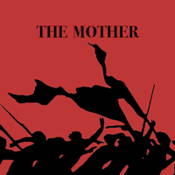
Overview
Synopsis
In the years preceding the Russian revolution, a poor woman, Pelagea Vlassova, worries for her son, Pavel. Pavel has fallen in with a bad crowd: a revolutionary group, distributing pamphlets in favor of unionisation. The group has printed 500 pamphlets in Pelagea’s living room, and it’s Pavel’s turn to distribute them. Pelagea - fearing for her son’s safety - offers to distribute the pamphlets on his behalf. As she hands out the pamphlets advocating for a worker strike, Pelagea sees the deplorable conditions of the factory, and comes to realize that the workers she thought were ruffians are right to fight the powers that be. On May Day, Pelagea attends a protest with the workers, and watches her son be arrested. To avoid arrest herself, she is forced into hiding in the home of a schoolmaster, who teaches her how to read, and accidentally refines her views on Marxism. Pelagea then takes up the flag of the worker, and begins to print and deliver pamphlets to farms and factories throughout the countryside, using her warmth and logic to bring both land-owners and laborers to the side of communism and becoming a folk-hero known as “The Mother.”
The most elaborate of Brecht’s Lehrstücke or “learning plays,” this poetic examination of the morality of communism and the fall of capitalism in 20th century Russia was based on Maxim Gorsky’s novel by the same name. Like many of Brecht’s plays, it includes a number of “songs” with no fixed arrangement that can be used or removed at the director’s discretion.
Show Information
Context
Plot
Characters
| Name | Part Size | Gender | Vocal Part |
|---|---|---|---|
|
Lead |
Female |
Non-singer |
|
|
Supporting |
Male |
Non-singer |
|
|
Supporting |
Male |
Non-singer |
|
|
Supporting |
Male |
Non-singer |
|
|
Featured |
Female |
Non-singer |
|
|
Featured |
Male |
Non-singer |
|
|
Featured |
Male |
Non-singer |
|
|
Featured |
Male |
Non-singer |
|
|
Featured |
Male |
Non-singer |
|
|
Featured |
Male |
Non-singer |
|
|
Featured |
Male |
Non-singer |
|
|
Featured |
Female |
Non-singer |
|
|
Ensemble |
Male |
Non-singer |
|
|
Ensemble |
Male |
Non-singer |
|
|
Ensemble |
Female |
Non-singer |
|
|
Ensemble |
Male |
Non-singer |
|
|
Ensemble |
Female |
Non-singer |
|
|
Ensemble |
Male |
Non-singer |
Songs
A song with an asterisk (*) before the title indicates a dance number; a character listed in a song with an asterisk (*) by the character's name indicates that the character exclusively serves as a dancer in this song, which is sung by other characters.
Monologues
Scenes
Key Terms
Sorry! We do not currently have terms for this guide.
Videos
Sorry! We do not currently have videos for this guide.
Quizzes
Themes, Symbols & Motifs
Sorry! We do not currently have learning modules for this guide.
Quote Analysis
Sorry! We do not currently have learning modules for this guide.
